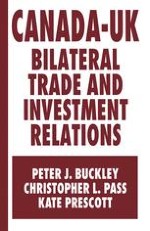1995 | OriginalPaper | Buchkapitel
Foreign Trade: Theory, Policies and Institutions
verfasst von : Peter J. Buckley, Christopher L. Pass, Kate Prescott
Erschienen in: Canada-UK Bilateral Trade and Investment Relations
Verlag: Palgrave Macmillan UK
Enthalten in: Professional Book Archive
Aktivieren Sie unsere intelligente Suche, um passende Fachinhalte oder Patente zu finden.
Wählen Sie Textabschnitte aus um mit Künstlicher Intelligenz passenden Patente zu finden. powered by
Markieren Sie Textabschnitte, um KI-gestützt weitere passende Inhalte zu finden. powered by
Superficially, both Canada and the UK are confronted with a dilemma in trade policy between what has been referred to as ‘diversification versus continentalism’, that is, should they seek to diversify their import sources and export destinations or tie themselves in more closely with fewer, more geographically — proximate trade partners? The logic of ‘comparative advantage’ suggests extensive multilateral trade relationships are preferable to narrowly proscribed ones as typified by regional trade blocs which often reflect parochial thinking and the promotion of sectional interests by discriminating against trade with non-member countries. The fact, however, that both Canada and the UK are members of regional trade blocs — the Canadian—USA Free Trade Agreement and the European Community/Union, respectively — must be looked at alongside the broader attempt, under the auspices of the General Agreement on Tariffs and Trade (GATT), to establish world-wide free trade. The lower the level of world tariff rates and the fewer non-tariff restrictions on trade the less likely it is that the creation of trade blocs per se will produce serious trade-reducing and trade-diversionary effects. Since Canada and the UK have both actively supported GATT trade liberalisation programmes then it could be argued that ‘diversification’—‘continentalism’ must be viewed as mutually complementary rather than as diametrically opposed trade policy doctrines. This said, however, the possibility of ‘divided’ loyalties cannot be dismissed lightly, and the ‘them’ and ‘us’ perceptions that this can create can sometimes present a serious obstacle to harmonious trade relations. For example, Papadopoulos (1986) has contended that the emergence of various trade ‘irritants’ between Canada and the European Community doomed the 1976 ‘Framework’ Agreement between them to early failure and galvanised Canadian thinking once more to the attractions of ‘Continentalism’ and a trade pact with the United States.
